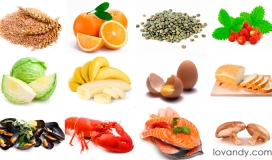Coconut milk is hardly as popular as a cow’s one. However, there are many unique benefits in consuming it. What are these? Is it worth a try? Let us take a look!
What is Coconut Milk?
Coconut milk is a sweet milky-white liquid, which is obtained from the pulp of ripe coconut. It appeared in Thai cuisine as a substitute for dairy products of animal origin, which the Thais neglected. It is important not to confuse this product with coconut water, or coconut juice. Milk is not formed in a nut naturally. It is made by flesh being rubbed on a grater and squeezed through gauze.
Depending on the number of squeezes, the product can be thick or liquid. Dense coconut milk is obtained after the first pressing. If you soak already used pulp in warm water and squeeze it another one or two times, you will get more liquid milk.
This product is an integral ingredient of most East Asian dishes. In its homeland – Thailand, coconut milk soup is very popular, which is served in the coconut itself. In Indonesia, Brunei and Malaysia, this product is called ‘Santana’, and the Filipinos call it ‘gata’.
A soft, delicate and, at the same time, rich taste of coconut milk was appreciated by Europeans: it is especially popular in French cuisine. There it is also called ‘Asian cream’ – the high content of butter and fats makes coconut milk (especially a dense one) an excellent alternative to cream.
The use of this product in cooking is very variable: coconut milk perfectly combines with many dishes. It is loved and appreciated for its versatility: it can soften even the spiciest dish and supplement any dessert treat with a rich sweet flavor.
Based on coconut milk, it is possible to prepare dozens of different sauces for meat, seafood, fish and sweet treats. In desserts, it replaces not only cream, but also a simple milk, flour and butter, which are usually added for the tenderness and subtlety of taste.
Find out more about milk nutrition facts:
Liquid coconut milk is used in many soups (in France, for example, coconut soup with prawns is popular) and cocktails (more often in fruit and non-alcoholic ones). It is also used in salads and second courses.
Carbs in Coconut Milk
Even though there are 6 grams of carbohydrates in 100 grams of raw coconut milk, you will only find such product in its homeland. In your local store, you can buy canned coconut milk, which is slightly different. Due to the way of storing, this milk contains only 3 grams of carbs.
Such a low number of carbohydrates means coconut milk should be less calorized than a regular one. However, that is not even close to the truth. The product we are talking about contains almost 3 times more calories than cow’s whole milk. That is due to a fat content, which we will consider later.
Is Coconut Milk Dairy Free?
Coconut milk is almost no different from a regular one in carbs content. Moreover, there is no lactose in here, which is a tough structure, hard to digest. Those who suffer from intolerance to lactose and allergies to lactose or milk sugars may have difficulty obtaining a daily calcium intake.
This element is critical for the body, ensuring the health of bones and teeth, and even preventing some forms of cancer.
Therefore, with lactose intolerance, it is difficult to know whether your body has received the necessary amount of calcium in the products of a daily diet. Fortunately, calcium is found in coconut milk, meaning it is a nice replacement. You do not need to drink some strangely tasted lactose-free milk, when you have coconuts.
Fat in Coconut Milk
There are not only good things about coconut milk. Especially when taking about its fat content.
Canned coconut milk contains more than 20 grams of fats per 100 g. That is almost 80% of a daily intake!
However, is such fat content that bad? The main fatty acid in coconut milk is lauric acid, which is the same fat that is abundant in human milk and which, as is known, stimulates mental development and promotes the healing of bones. It also has anticancerogenic and antipathogenic properties.
Lauric acid is easily absorbed and saturates your body with energy. It is not transformed in cholesterol, meaning you will hardly gain weight with coconut milk.
By the way, considering the low percentage of carbs in coconut milk, it is nice to have such big amount of useful vegetable fats in there. They can give your cells as much energy, as regular glucose and sucrose do.
What is Full Fat Coconut Milk?
Full fat coconut milk is a regular one. This kind is made from the first squeeze. It contains almost all the fats from coconut peel, meaning there are more vitamins in there. However, such amount of fatty acids (even healthy ones) may be inappropriate for some diets. If so, there is a low fat coconut milk.
Low Fat Coconut Milk
This one is made from third and fourth squeezes. In addition, some fats might be removed artificially. Low fat coconut milk is a nice choice for those who is on a tough diet, but it is not as beneficial as a full fat one. There is no protein in there. On the other hand, there is much more calcium. Therefore, low fat milk is good when having lactose intolerance.
Does Coconut Milk Have Protein?
There is not much protein in coconut milk content. The value is approximately 4% of the daily intake. However, a regular milk has almost the same amount. Therefore, it is no big deal. Especially considering the vitamin composition of coconut milk, even though some of them are absent.
There are some vitamins of group B and also a whole milligram of C.
Even though the protein percentage is low for coconut milk, it might be useful for sportsmen, as it can grant a lot of essential energy and useful minerals.
Is Coconut Milk Gluten Free?
Gluten is a group of storing proteins found in seeds of cereal plants, in particular wheat, rye, oats and barley. It is of great importance in the baking industry, determining the elasticity of dough, and the quality of flour.
Celiac disease is a genetically predisposed intolerance to foods containing gluten. This substance is not considered very healthy, but if you have such disease, you should eat only gluten-free products.
There is no gluten in coconut milk. It is not that important for a beverage, but for coconut flour. It can be used as a replacement of a regular one.
How Much Sugar is in Coconut Milk?
There are 8 grams of sugars in a cup of a raw coconut milk. And this value is even less for a canned one. Therefore, you should not worry about this milk being too sweet. If you have diabetes, this product is a nice thing for you. Drink it in replacement to a cow’s milk for getting all the vitamins needed.
Coconut Milk Nutrition Chart (Glycemic Index = 40)*
| Name of nutrition component | Content per 1 cup | Content per 100 g | Percent of daily intake |
|---|---|---|---|
| Proteins | 5,3 g | 2,1 g | 4,6% |
| Fats | 53,3 g | 21,3 g | 78,9% |
| Carbohydrates | 7,0 g | 2,8 g | 2,2% |
| Sugars | 4,3 g | 1,7 g | 6,8% |
| Calcium | 45 mg | 18 mg | 1,8% |
| Iron | 7,5 mg | 3 mg | 16,7% |
| Magnesium | 115 mg | 46 mg | 14,4% |
| Phosphorus | 240 mg | 96 mg | 13,7% |
| Potassium | 550 mg | 220 mg | 4,7% |
| Sodium | 33 mg | 13 mg | 0,6% |
| Zinc | 1400 µg | 560 µg | 7,0% |
| Vitamin A | – | – | – |
| Vitamin B1 | 55 µg | 22 µg | 2,0% |
| Vitamin B2 | – | – | – |
| Vitamin B3 (PP) | 1593 µg | 637 µg | 4,6% |
| Vitamin B6 | 70 µg | 28 µg | 2,2% |
| Vitamin B9 | 35 µg | 14 µg | 3,5% |
| Vitamin B12 | – | – | – |
| Vitamin C | 2,5 mg | 1 mg | 1,3% |
| Vitamin D | – | – | – |
| Fatty acids, saturated | 47,3 g | 18,9 g | as low as possible |
| Fatty acids, monounsaturated | 2,3 g | 0,9 g | 2,9% |
| Fatty acids, polyunsaturated | 0,5 g | 0,2 g | 1,7% |
| Cholesterol | – | – | – |
*Calculated for a canned coconut milk. According to USDA
Coconut milk is a nice and nutrient replacement of a cow’s one. It does not contain any gluten or lactose, making it a cool thing for those who have some allergies. Moreover, its vitamin content is almost as full as a regular one’s. Overall, coconut milk is really tasty. Try it! Perhaps you will no longer want regular dairy products.














